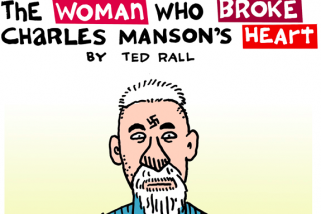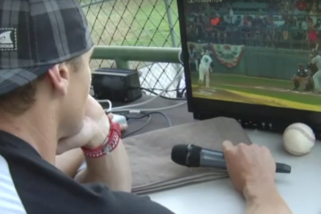BreakingModern — Marshawn Lynch is a running back for the NFL’s Seattle Seahawks. He may be a shining star on the playing field, but he’s a falling star with sports reporters because of his terse and random interview responses.
He never liked being interviewed anyway.
Lynch only decided to take part in such interviews because he was fined $100,000 by the NFL for avoiding all media contact.
But while Lynch may seem annoyed by the swarm of reporters buzzing around his locker, his answers really are no worse than the ones many media-friendly athletes give.
Generic post-game interviews don’t provide any insight into the game itself. It’s true that Lynch has received a lot of negative publicity for his condescending answers to reporters’ queries.
But his many of his peers are every bit as guilty of hindering real stories from being published.
Athletes who happily give interviews but just offer bland cookie-cutter answers interview questions undercut sports journalism just as much if not more than Lynch’s semi hostile answers.
Keeping Sports Media on Its Toes
Lynch has done what every player wants to do: He’s put the media in its place.
From my position as a sports journalist, I can see why he and other athletes would want to.
I’ve spent hours in press conferences at Stanford men’s basketball games, for example, trying to establish rapport with athletes. I found it to be nearly impossible. My older, more established colleagues never hesitated to jump in with their long, complex questions. That clearly didn’t work, and no wonder. Players wouldn’t know how to respond to rambling, multi level questions on such short notice, so naturally they’d read the “script” that athletes have been taught to follow.
As a result of such poor athlete interviewing techniques, players invariably wouldn’t or couldn’t address whatever issues these reporters raised.
Also, athletes are right to be annoyed by sports media for another reason. Reporters have a tendency to ask too many nosy questions, especially ones around minor injuries.
Lynch, for example, was asked about his back and stomach problems that didn’t affect his game-day performance. The Seahawks opponent in that game, the Arizona Cardinals, was the best team in the league at the time, but that still didn’t excuse all the needlessly intrusive and even irrelevant questions. L
Lynch’s simple response of “Yeah” to these questions forced reporters to reconsider their interview techniques.
And this is a good thing.
As result of pushback from Lynch and others like him, reporters could no longer just try to be the first to ask a question. They’ve had to learn to refine their questions to find a middle ground between being aggressive and being bland.
Original stories don’t come from leading questions. For best results, reporters need to be more genuine and more conversational with players. They need to give the athlete the opportunity to share interesting stories and information. Marshawn Lynch-style answers now is forcing more sports reporters to be better reporters and do exactly that.
Grounded
Ironically, Lynch’s terse answers to reporters’ questions has increased attention on his ongoing charitable work. For example, he used a recent interview to promote his “foundation dinner.” As it turns out, Lynch’s personal civic efforts are more than most athletes. His “The Fam 1st Family Foundation” has a goal of building “self-esteem and academic learning skills in underprivileged youth.” People in the community will remember his charitable efforts for years to come, not the “Cardinals’ defense.” It’s important to see the bigger picture. Reporters should emphasize the good deeds of athletes on and off the field.
Who knows? Ultimately, Lynch’s combative relationship with the media might turn out to be a good thing. His thought-provoking conduct could change the culture of journalism for the better.
Model for Personal Topics
Although published before Lynch’s interviews, Jordan Ritter Conn wrote an article on Cuban pitcher Jose Fernandez’s arduous defection from his native country. In the middle of a grueling MLB season, Conn was able to brilliantly document Fernandez’s difficult journey while still maintaining Fernandez’s and his own dignity. Here is a excerpt from his story:
“Three times, they set off for Miami. Three times, they failed. Fernandez spent a few months in a Cuban prison, an attempted defector surrounded by murderers, a 14-year-old boy locked up with grown men. He doesn’t ever want to think about the food again — ‘I have no idea how I would even describe it in English,’ he says, ‘but believe me, you don’t want to know.’ He tries not to remember all those bodies cramped into so little space. And he doesn’t let his mind dwell on the inmate killings. ‘To them, their lives were already over,’ Fernandez says. ‘What did it matter to them if they killed you? That’s just one more murder.’”
Conn’s apparently great relationship with Fernandez enabled him to coax a gripping story out of the young pitcher. Instead of coming off as intrusive, Conn’s friendly demeanor made Fernandez open up about a life-or-death experience. As a result, Conn crafts a story that makes the reader feel the fear and oppressive heat that Fernandez felt in Cuba. This story is a model for journalists who want to produce original and unique content without badgering players.
Lynch verbalizes the feelings of athletes (and many journalists and readers). At this point, everyone is weary of dull sports stories about jocks working together and improving as a team.
After all, every team works together. But not every team or player has an interesting story. To find these stories, reporters need to approach athletes as people – not subhuman beings who quickly open up to personal topics.
Like every other profession, journalism is grappling with the newly emerging information age.
Deadline-crazed reporters always needed to take a step back and think about their athlete interviewing techniques. And, thanks in large part to Lynch, more of us are now.
For BMod, I’m Ben Leonard.
Featured image/screenshot: Ben Leonard







![Who’s Going to Get “Lucky” This NBA Season? [commentary]](../wp-content/uploads/2015/10/HEADER4-60x60.jpg)
![Pete Rose Continues to be Out of Step with Major League Baseball [commentary]](../wp-content/uploads/2015/10/HEADER2-60x60.png)

![Cooking Fever [review]](../wp-content/uploads/2015/11/HEADER1-321x214.png)
![Assassin’s Creed Syndicate [review]](../wp-content/uploads/2015/11/HEADER3-60x60.jpg)
![The Legend of Zelda: A Link to the Past [manga review]](../wp-content/uploads/2015/10/HEADER3-60x60.png)
![Madden NFL Mobile [review]](../wp-content/uploads/2015/09/header3-60x60.jpg)
January 23, 2022
I agree with he points you made. There are plenty of examples of Lynch doing ok in one on one interviews, from ESPN’s 30 for 30, to a Japanese TV interview that was a seven minute segment about candy. I truly believe his aversion to interviews is borne out of genuine anxiety and not arrogance. He’s a hard working guy on and off the field and it seems rather outrageous that the NFL’s highest player fine all year is not for a dirty hit, or criminal misconduct, but for not showing up for an interview. Especially from a league that offers “no comment” when its PR guy is asked if the league has talked to Tom Brady about the football inflation issue. The league piles on him with fines for his Elvis or Michael jackson style crotch grab in his TD celebration, under the guise of penalizing an ‘offensive’ gesture, yet the league stands in defiance when a large minority group protests the offensive use of a racial slur as a team name.